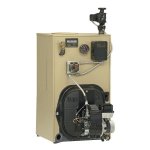I'm in the process of buying an older home, built in 1971. It's a rancher, with a basement, total of 2200 Square ft. It has oil baseboard heat, and a hot water oil boiler. It's a rancher, so half of the 2200 sq. ft. are all on the walk in level. It may need a new boiler, which could run into several thousands, just wondering what's involved in switching to some other way of heating the water, something doesn't sit right with me having to buy oil year round just to take a hot shower.
I've only lived in homes that have everything electric, and my current home, is about 1300 sq feet on main level and upstairs, basement probably another 700 sq. feet. I've never had an electric bill more than $200 in the coldest months, and since I had all the windows replaced, the bill was in the $140 range. Just 2 adults, no kids.
I know oil heat is expensive, but I have been told it "feels" much better. It's also supposedly more efficient. All I hear are bad things, and all the local HVAC companies do nothing but bad mouth it.......
Main concern now, is heating the water. This boiler has some malfunction, where the water is at 210 degrees constantly, and you can feel heat radiating off of the unit. I don't know if certain components can get replaced, or if usually they just fail. The current unit is about 25 years old, and it has a lot of corrosion on the outside.
This is similar to what is in place now:

I've only lived in homes that have everything electric, and my current home, is about 1300 sq feet on main level and upstairs, basement probably another 700 sq. feet. I've never had an electric bill more than $200 in the coldest months, and since I had all the windows replaced, the bill was in the $140 range. Just 2 adults, no kids.
I know oil heat is expensive, but I have been told it "feels" much better. It's also supposedly more efficient. All I hear are bad things, and all the local HVAC companies do nothing but bad mouth it.......
Main concern now, is heating the water. This boiler has some malfunction, where the water is at 210 degrees constantly, and you can feel heat radiating off of the unit. I don't know if certain components can get replaced, or if usually they just fail. The current unit is about 25 years old, and it has a lot of corrosion on the outside.
This is similar to what is in place now:

Last edited:
